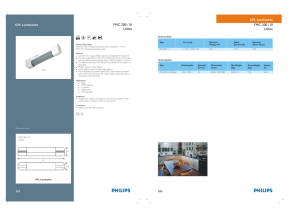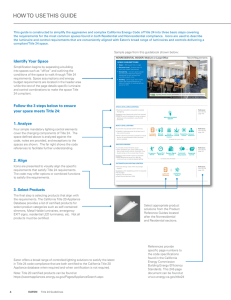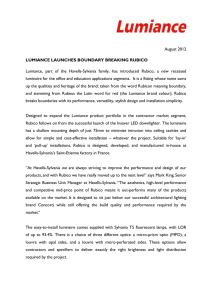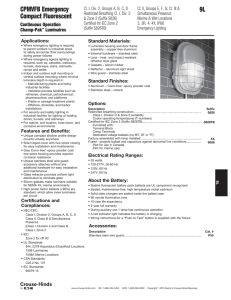Can the wiring of normal and emergency power circuits be
advertisement
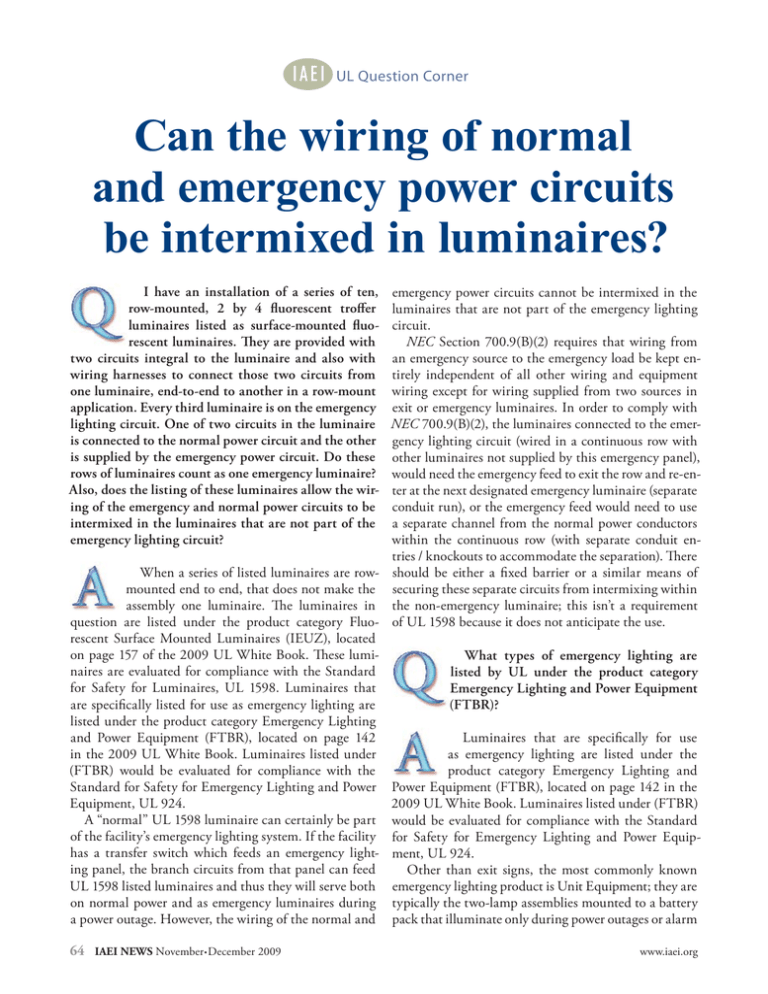
I AEI UL Question Corner Can the wiring of normal and emergency power circuits be intermixed in luminaires? emergency power circuits cannot be intermixed in the luminaires that are not part of the emergency lighting circuit. NEC Section 700.9(B)(2) requires that wiring from an emergency source to the emergency load be kept entirely independent of all other wiring and equipment wiring except for wiring supplied from two sources in exit or emergency luminaires. In order to comply with NEC 700.9(B)(2), the luminaires connected to the emergency lighting circuit (wired in a continuous row with other luminaires not supplied by this emergency panel), would need the emergency feed to exit the row and re-enter at the next designated emergency luminaire (separate conduit run), or the emergency feed would need to use a separate channel from the normal power conductors within the continuous row (with separate conduit entries / knockouts to accommodate the separation). There When a series of listed luminaires are row- should be either a fixed barrier or a similar means of mounted end to end, that does not make the securing these separate circuits from intermixing within assembly one luminaire. The luminaires in the non-emergency luminaire; this isn’t a requirement question are listed under the product category Fluo- of UL 1598 because it does not anticipate the use. rescent Surface Mounted Luminaires (IEUZ), located on page 157 of the 2009 UL White Book. These lumiWhat types of emergency lighting are naires are evaluated for compliance with the Standard listed by UL under the product category for Safety for Luminaires, UL 1598. Luminaires that Emergency Lighting and Power Equipment are specifically listed for use as emergency lighting are (FTBR)? listed under the product category Emergency Lighting and Power Equipment (FTBR), located on page 142 Luminaires that are specifically for use in the 2009 UL White Book. Luminaires listed under as emergency lighting are listed under the (FTBR) would be evaluated for compliance with the product category Emergency Lighting and Standard for Safety for Emergency Lighting and Power Power Equipment (FTBR), located on page 142 in the Equipment, UL 924. 2009 UL White Book. Luminaires listed under (FTBR) A “normal” UL 1598 luminaire can certainly be part would be evaluated for compliance with the Standard of the facility’s emergency lighting system. If the facility for Safety for Emergency Lighting and Power Equiphas a transfer switch which feeds an emergency light- ment, UL 924. ing panel, the branch circuits from that panel can feed Other than exit signs, the most commonly known UL 1598 listed luminaires and thus they will serve both emergency lighting product is Unit Equipment; they are on normal power and as emergency luminaires during typically the two-lamp assemblies mounted to a battery a power outage. However, the wiring of the normal and pack that illuminate only during power outages or alarm I have an installation of a series of ten, row-mounted, 2 by 4 fluorescent troffer luminaires listed as surface-mounted fluorescent luminaires. They are provided with two circuits integral to the luminaire and also with wiring harnesses to connect those two circuits from one luminaire, end-to-end to another in a row-mount application. Every third luminaire is on the emergency lighting circuit. One of two circuits in the luminaire is connected to the normal power circuit and the other is supplied by the emergency power circuit. Do these rows of luminaires count as one emergency luminaire? Also, does the listing of these luminaires allow the wiring of the emergency and normal power circuits to be intermixed in the luminaires that are not part of the emergency lighting circuit? 64 IAEI NEWS November.December 2009 www.iaei.org I AEI UL Question Corner signal events. UL 924 also covers emergency luminaires, which could be of one of two types: 1. Integral emergency battery pack system (inverter/ charger pack)—the luminaire has only one connection to the facility power source (normal utility power). When the normal power drops out, the on-board battery pack kicks in. These are essentially “normal” UL 1598, The Standard for Safety for Luminaires, listed luminaires with a UL 924-listed inverter charger pack, test switch, and indicator lights added either at the luminaire factory or in the field. In most all cases, the inverter/charger pack is sized to feed only the lamps within that luminaire, although it is possible to oversize the pack and feed an adjacent / additional luminaire. However, in most cases, the emergency circuit would not leave the luminaire that houses the inverter/charger pack. 2. Dual power source connection—two separate lead wire sets, one from the utility and a separate set from the emergency source, each energizing separate lamps within the luminaire. This construction is relatively uncommon today, typically due to improvements in luminaire efficiency and the expense of including emergency components that sit idle most of the time. The standard for “normal” luminaires, UL 1598, does allow for the inclusion of a back-up battery; however, it does not evaluate the power capacity of that battery and thus those luminaires are not permitted to be marked as “emergency luminaires.” The special UL meeting for government inspections provide us an excellent opportunity to ask questions of UL engineers and to clarify UL requirements. The “UL Question Corner” answers questions of general interest that are sent in from authorized government inspectors and we believe will have interest for many inspectors. Please send us questions you may have that are of general interest, and we will have UL engineers answer them in a future issue. If space does not permit answering all questions, we’ll see that you get an answer by letter. Send your questions to: UL Question Corner PO Box 830848 Richardson, TX 75083-0848 www.iaei.org November.December 2009 IAEI NEWS 65
